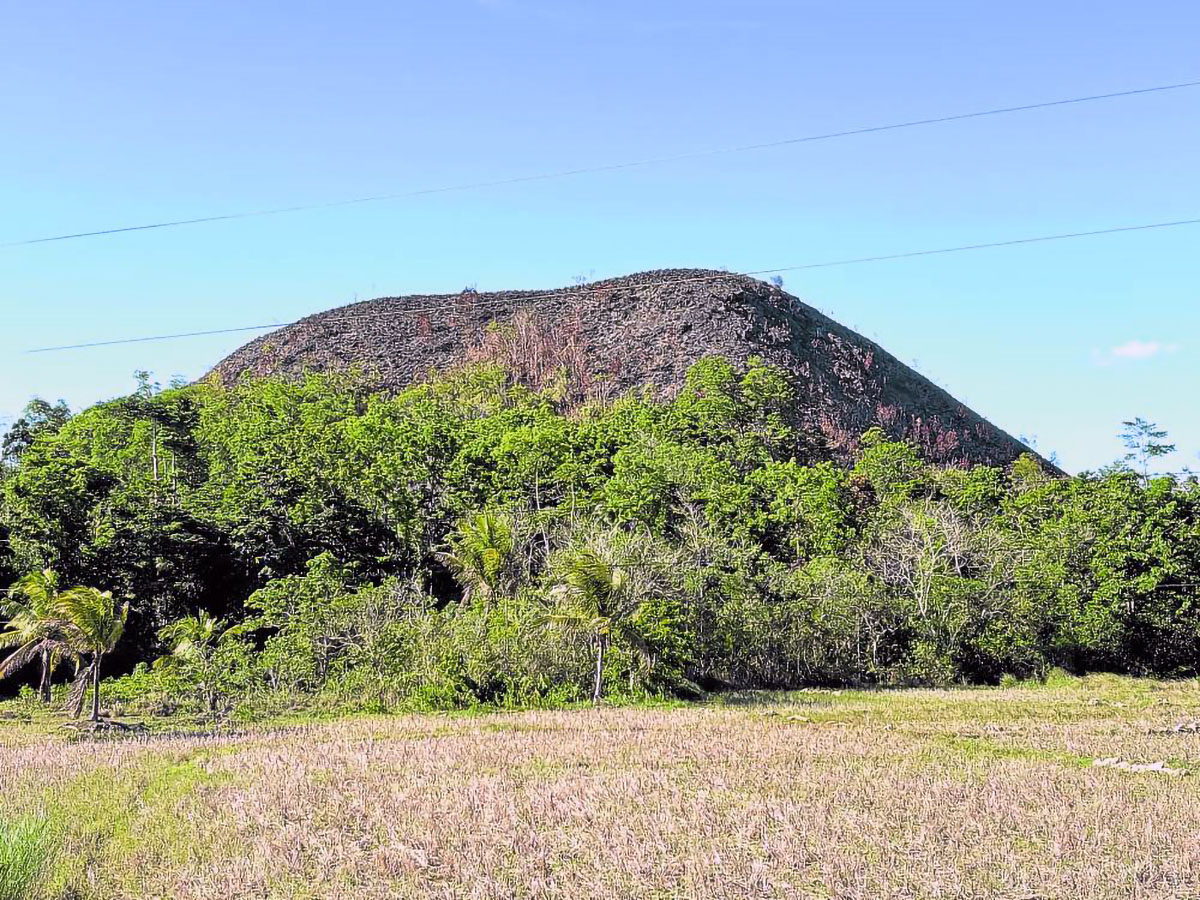DENR issues violation notices to Chocolate Hills residents

FIRE AFTERMATH The grass covering a hill within the Chocolate Hills area at Barangay Santa Cruz in Batuan, Bohol, has yet to regrow after the area was reportedly burned by residents angered by the Department of Environment and Natural Resources’ restrictions that prevent them from making improvements in their properties within the protected site. —Leo Udtohan
BATUAN, BOHOL, Philippines — At least 90 residents living near the Chocolate Hills have received notices of violations from the Department of Environment and Natural Resources (DENR) for putting up improvements in a protected area.
But Batuan Mayor Antonino Jumawid and Ian Bernadez, village chief of Santa Cruz also in Batuan, said the residents did not take the notices of violations too lightly as some of them tore the notices in front of DENR personnel while others reportedly burned some portions of the Chocolate Hills.
However, no one had been arrested for arson due to lack of evidence, according to Jumawid and Bernadez. The local police and fire department later recorded these as “grass fires.”
READ: Bohol leaders double efforts to protect Chocolate Hills
“They were just emotional … Their ancestors have been occupying [these areas] centuries before the DENR declared the area [as] protected [site],” said Bernadez, also the president of Batuan Association of Barangay Chairmen.
Article continues after this advertisementThe Chocolate Hills, a geological wonder, consist of 1,776 mounds spread over the towns of Bilar, Carmen, Batuan, Sierra Bullones and Sagbayan. These are protected under the Expanded National Integrated Areas Protected System Act or Republic Act No. 7586, as amended by RA 11038.
Article continues after this advertisementSeventy of these hills are located in Barangay Santa Cruz in Batuan. One of them is near the house of Bernadez.
Preservation of the Chocolate Hills became a focal point after a resort was allowed to build structures, including a swimming pool, at the foot of the hills in Sagbayan.
Public outrage prompted government agencies to investigate, leading to the six-month preventive suspension of 69 Bohol officials, including Gov. Erico Aristotle Aumentado.
Among those suspended were Jumawid and Bernadez.
Both officials said the DENR is now cracking the whip on residents who have put up structures inside the protected area, like toilets and “sari-sari” (variety) stores.
Illegal structures
“The residents are mad,” said Bernadez, noting that this might have prompted some of them to set sections of the Chocolate Hills on fire.
Bernadez did not say the extent of damage or how many hills were hit by fire, but said he received reports of at least two incidents per week in April during the height of the government inquiry into the illegal structures within the Chocolate Hills.
It is now illegal for anybody in Batuan to introduce developments to his own backyard, even if it is far from the Chocolate Hills, unless the Protected Area Management Board (PAMB) issues as a clearance and an Environmental Compliance Certificate (ECC), Jumawid said.
He said owners of even small or backyard enterprises, like sari-sari stores or vulcanizing shops, had been directed to secure an ECC or else they might either be fined or jailed.
“It is almost impossible for a farmer or ordinary person to secure an ECC,” said the mayor.
“To secure an ECC, the DENR will advise you to hire a third party who demands a professional fee, which the majority could not afford. After a long period of processing and making follow-ups, the DENR may issue an ECC. When an ECC is issued, the lot owner will be required to pay 5 percent of the cost of the land and 1 percent of the value [of development plan], aside from other regular fees,” he added.
No consultation
Jumawid said the people of Batuan were never consulted about the Chocolate Hills National Monument law or who shall compose the PAMB.
Private lands that are part of the hills and the buffer zone, he said, must be expropriated and that lot owners should be paid and relocated.
Jumawid said most people in Batuan, who live near the Chocolate Hills, are willing to be relocated and given livelihood in another place or in any other area in the town.
“The people and officials of Batuan are not criminals or violators [of the law]. They are victims. The criminals are those who rob the people of their property, those who take away private lands from the poor farmers who have no other land but their small farm. The Constitution provides that, ‘No private property shall be taken for public use without just compensation,’” he said.
“Na-feel nako ang kasuko sa mga tawo (I can feel the anger of the people),” Jumawid said.